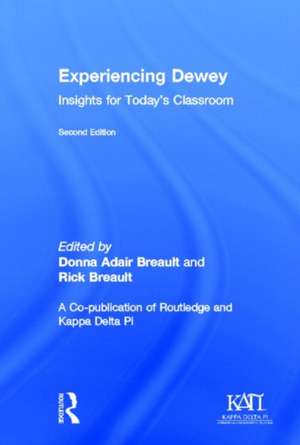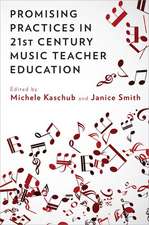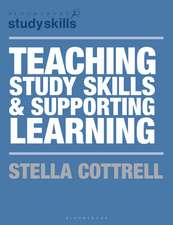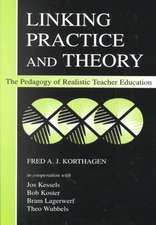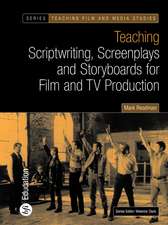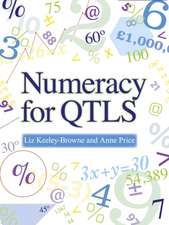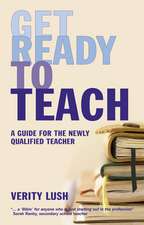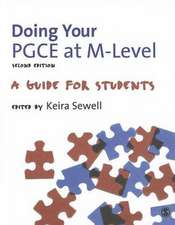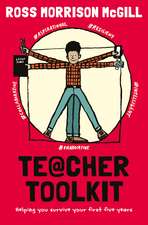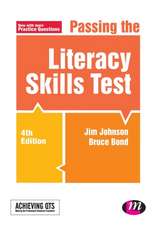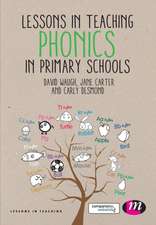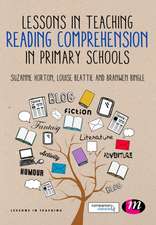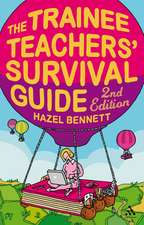Experiencing Dewey: Insights for Today's Classrooms: Kappa Delta Pi Co-Publications
Editat de Donna Adair Breault, Rick Breaulten Limba Engleză Hardback – 4 noi 2013
Co-published with Kappa Delta Pi, International Honor Society in Education, Experiencing Dewey remains a powerful resource for current and aspiring teachers. This thoroughly updated edition also includes online resources for teacher educators to help facilitate the book’s use in higher education courses.
| Toate formatele și edițiile | Preț | Express |
|---|---|---|
| Paperback (1) | 237.01 lei 6-8 săpt. | |
| Taylor & Francis – 7 oct 2013 | 237.01 lei 6-8 săpt. | |
| Hardback (1) | 815.60 lei 6-8 săpt. | |
| Taylor & Francis – 4 noi 2013 | 815.60 lei 6-8 săpt. |
Preț: 815.60 lei
Preț vechi: 1102.99 lei
-26% Nou
Puncte Express: 1223
Preț estimativ în valută:
156.10€ • 162.70$ • 129.95£
156.10€ • 162.70$ • 129.95£
Carte tipărită la comandă
Livrare economică 06-20 ianuarie 25
Preluare comenzi: 021 569.72.76
Specificații
ISBN-13: 9780415841634
ISBN-10: 0415841631
Pagini: 242
Dimensiuni: 152 x 229 x 20 mm
Greutate: 0.48 kg
Ediția:Revizuită
Editura: Taylor & Francis
Colecția Routledge
Seria Kappa Delta Pi Co-Publications
Locul publicării:Oxford, United Kingdom
ISBN-10: 0415841631
Pagini: 242
Dimensiuni: 152 x 229 x 20 mm
Greutate: 0.48 kg
Ediția:Revizuită
Editura: Taylor & Francis
Colecția Routledge
Seria Kappa Delta Pi Co-Publications
Locul publicării:Oxford, United Kingdom
Public țintă
Professional Practice & DevelopmentCuprins
Foreword by Deron Boyles
Introduction by Rick Breault and Donna Adair Breault
Part I: Accountability Accountability: To Whom, for Whom, and by Whom? by Rick Breault
1. A Call for Creativity and Freedom in the Midst of Accountability: A Teachable Moment by Maggie Allison
2. Tracing Anew the Process of Learning by A. G. Rud
3. Responsibility not Accountability: The Experiential Artistry of Teaching by Walter S. Gershon
4. An Alternative Image of Data: Not What but Where by Sebastián Díaz
5. Who Is Accountable? by Alexander David Tuel
6. Art and Accountability by Kyle Greenwalt
7. On Democratic Accountability and the Educative Experience by Patrick M. Jenlink
8. How Mechanization Leads to Contempt for the Teaching and Learning Process by Louise Anderson Allen
9.Teaching Our Legislators a Big Idea in 52 Words or Less by Peter S. Hlebowitsh
10. What Imposed Standards Do to the Child bt M. Frances Klein
11. Collecting and Preserving the Educational Present by Craig Kridel
Part II: Active Learning Active Learning: A Growth Experience by Rick Breault
12. A Spectator’s Version of Knowledge by Deron Boyles
13. Making Informed Judgments by Dan Marshall
14. The Growth of Future Generations Starts Today by Jonathan T. Martin
15. Experience, Heightened Vitality, and Aesthetic Engagement, or Why Is Stick Man Smiling? by P. Bruce Urmacher and Christy M. Moroye
16. Listening for the Gentle Whisper by Rick Breault
17. Work in School by Donna Adair Breault
18. Active Learning as Reflective Experience by William H. Schubert
19. Providing Environments Conducive to Proper Digestion by Lisa Goeken-Galliart
20. Becoming a Student of Teaching by Robert V. Bullough, Jr.
21. Effort: The Outgrowth of Individual Interest by Robert C. Morris
Part III: Critical Thinking The ‘Varied and Unusual’ Abuses of Critical Thinking by Donna Adair Breault
22. The Dangers of Imagination by Robert Boostrom
23. The Importance of Freedom of Thought by Matthew Keeler
24. Transcending False Dichotomies: Confronting One of Life’s Consistently Compelling Challenges by Thomas E. Kelly
25. Educator’s Professional Freedom for Students’ Democratic Liberation by James G. Henderson
26. American Students and the Explorer’s Mind by Laura Dawes
27. Dewey’s Freedom of Intelligence by Linda O’Neill
28. Unexamined Presumptions by George W. Noblit
Part IV: Democratic Citizenship Preparing Children for Democratic Citizenship by Rick Breault
29. Teaching Democracy for Life by John M. Novak
30. Education for a Changing World by William Ayers
31. John Dewey and the American Creed by Daniel Tanner
32. John Dewey and the Import of a Curriculum Devoted to Student Experience by Chara Haeussler Bohan
33. The Best and Wisest Parent by David J. Flinders
34. Building a Community of Inquirers by Sam F. Stack Jr.
35. A Being Connected with Other Beings by Audrey M. Dentith
36. The Value of Communication in a Classroom Community by Barbara J. Thayer-Bacon
37. Realizing a Common Good by Randy Hewitt
38. Teacher as Shaper of Social Process by Louise M. Berman
39. The Societal Purpose of Education by Jesse Goodman
40. Foundations of Deweyan Democracy: Human Nature, Intelligence, and Cooperative Inquiry by Stephen M. Fishman
41. Why We Forget: Liberty, Memories, and Seeking Simple Answers by David M. Callejo-Pérez
Part V: The Educative Experience An Educative Experience? A Lesson in Humility for a Second-Grade Teacher by Donna Adair Breault
42. Aesthetics of Human Understanding by Margaret Macintyre Latta
43. Growth: The Consummate Open-Ended Aspiration by Paul Shaker
44. The Relations of One Great Common World by Gary Weilbacher
45. Learning In and Out of School: Bridging the Cultural Gap by Ron W. Wilhelm
46. The Child and the Curriculum: Two Limits That Define a Single Process by William A. Reid
47. The Reconstruction of Experience by Edmund C. Short
48. The Teacher-Artist by George Willis
49. ‘Of all affairs, communication is the most wonderful’ by Gert Biesta
Part VI: Inquiry and Education Inquiry and Education: A Way of Seeing the World by Donna Adair Breault
50. The Power of an Ideal by Jim Garrison
51. Dogma, Democracy, and Education by William G. Wraga
52. The Role of Intelligence in the Creation of by Art Elliot W. Eisner
53. Imagination of Ideal Ends by Craig A. Cunningham
54. The Teacher as Theorist and Lover by Greg Seals
55. Autonomous Education: Free to Determine Its Own Ends by Larry A. Hickman Editors and Contributors
Introduction by Rick Breault and Donna Adair Breault
Part I: Accountability Accountability: To Whom, for Whom, and by Whom? by Rick Breault
1. A Call for Creativity and Freedom in the Midst of Accountability: A Teachable Moment by Maggie Allison
2. Tracing Anew the Process of Learning by A. G. Rud
3. Responsibility not Accountability: The Experiential Artistry of Teaching by Walter S. Gershon
4. An Alternative Image of Data: Not What but Where by Sebastián Díaz
5. Who Is Accountable? by Alexander David Tuel
6. Art and Accountability by Kyle Greenwalt
7. On Democratic Accountability and the Educative Experience by Patrick M. Jenlink
8. How Mechanization Leads to Contempt for the Teaching and Learning Process by Louise Anderson Allen
9.Teaching Our Legislators a Big Idea in 52 Words or Less by Peter S. Hlebowitsh
10. What Imposed Standards Do to the Child bt M. Frances Klein
11. Collecting and Preserving the Educational Present by Craig Kridel
Part II: Active Learning Active Learning: A Growth Experience by Rick Breault
12. A Spectator’s Version of Knowledge by Deron Boyles
13. Making Informed Judgments by Dan Marshall
14. The Growth of Future Generations Starts Today by Jonathan T. Martin
15. Experience, Heightened Vitality, and Aesthetic Engagement, or Why Is Stick Man Smiling? by P. Bruce Urmacher and Christy M. Moroye
16. Listening for the Gentle Whisper by Rick Breault
17. Work in School by Donna Adair Breault
18. Active Learning as Reflective Experience by William H. Schubert
19. Providing Environments Conducive to Proper Digestion by Lisa Goeken-Galliart
20. Becoming a Student of Teaching by Robert V. Bullough, Jr.
21. Effort: The Outgrowth of Individual Interest by Robert C. Morris
Part III: Critical Thinking The ‘Varied and Unusual’ Abuses of Critical Thinking by Donna Adair Breault
22. The Dangers of Imagination by Robert Boostrom
23. The Importance of Freedom of Thought by Matthew Keeler
24. Transcending False Dichotomies: Confronting One of Life’s Consistently Compelling Challenges by Thomas E. Kelly
25. Educator’s Professional Freedom for Students’ Democratic Liberation by James G. Henderson
26. American Students and the Explorer’s Mind by Laura Dawes
27. Dewey’s Freedom of Intelligence by Linda O’Neill
28. Unexamined Presumptions by George W. Noblit
Part IV: Democratic Citizenship Preparing Children for Democratic Citizenship by Rick Breault
29. Teaching Democracy for Life by John M. Novak
30. Education for a Changing World by William Ayers
31. John Dewey and the American Creed by Daniel Tanner
32. John Dewey and the Import of a Curriculum Devoted to Student Experience by Chara Haeussler Bohan
33. The Best and Wisest Parent by David J. Flinders
34. Building a Community of Inquirers by Sam F. Stack Jr.
35. A Being Connected with Other Beings by Audrey M. Dentith
36. The Value of Communication in a Classroom Community by Barbara J. Thayer-Bacon
37. Realizing a Common Good by Randy Hewitt
38. Teacher as Shaper of Social Process by Louise M. Berman
39. The Societal Purpose of Education by Jesse Goodman
40. Foundations of Deweyan Democracy: Human Nature, Intelligence, and Cooperative Inquiry by Stephen M. Fishman
41. Why We Forget: Liberty, Memories, and Seeking Simple Answers by David M. Callejo-Pérez
Part V: The Educative Experience An Educative Experience? A Lesson in Humility for a Second-Grade Teacher by Donna Adair Breault
42. Aesthetics of Human Understanding by Margaret Macintyre Latta
43. Growth: The Consummate Open-Ended Aspiration by Paul Shaker
44. The Relations of One Great Common World by Gary Weilbacher
45. Learning In and Out of School: Bridging the Cultural Gap by Ron W. Wilhelm
46. The Child and the Curriculum: Two Limits That Define a Single Process by William A. Reid
47. The Reconstruction of Experience by Edmund C. Short
48. The Teacher-Artist by George Willis
49. ‘Of all affairs, communication is the most wonderful’ by Gert Biesta
Part VI: Inquiry and Education Inquiry and Education: A Way of Seeing the World by Donna Adair Breault
50. The Power of an Ideal by Jim Garrison
51. Dogma, Democracy, and Education by William G. Wraga
52. The Role of Intelligence in the Creation of by Art Elliot W. Eisner
53. Imagination of Ideal Ends by Craig A. Cunningham
54. The Teacher as Theorist and Lover by Greg Seals
55. Autonomous Education: Free to Determine Its Own Ends by Larry A. Hickman Editors and Contributors
Notă biografică
Donna Adair Breault is department head of Childhood Education and Family Studies at Missouri State University.
Rick Breault is director of the Southwest Regional Professional Development Center at Missouri State University.
Rick Breault is director of the Southwest Regional Professional Development Center at Missouri State University.
Recenzii
"This second edition of Experiencing Dewey expands and strengthens an already highly useful text. The Breaults have once again extended Dewey's legacy by inviting new authors to re-imagine contemporary challenges in light of Dewey's work. This text will no doubt help new and seasoned Dewey readers alike to connect Dewey's work to the myriad problems we face today.”—Wesley Null, Vice Provost for Undergraduate Education, Baylor University
“As a teacher educator and former public school teacher, I still find Dewey’s work both formative and transformative. This book reminds us of Dewey’s profound impact on education and the need to reflect and engage in a national discourse about the value of experience in the learning process as we prepare students for the 21st Century.”—Maria Stallions, Associate Professor, Education, Roanoke University
“As a teacher educator and former public school teacher, I still find Dewey’s work both formative and transformative. This book reminds us of Dewey’s profound impact on education and the need to reflect and engage in a national discourse about the value of experience in the learning process as we prepare students for the 21st Century.”—Maria Stallions, Associate Professor, Education, Roanoke University
Descriere
Experiencing Dewey: Insights for Today’s Classroom offers an inspiring introduction to one of the most seminal figures in the field of education.
